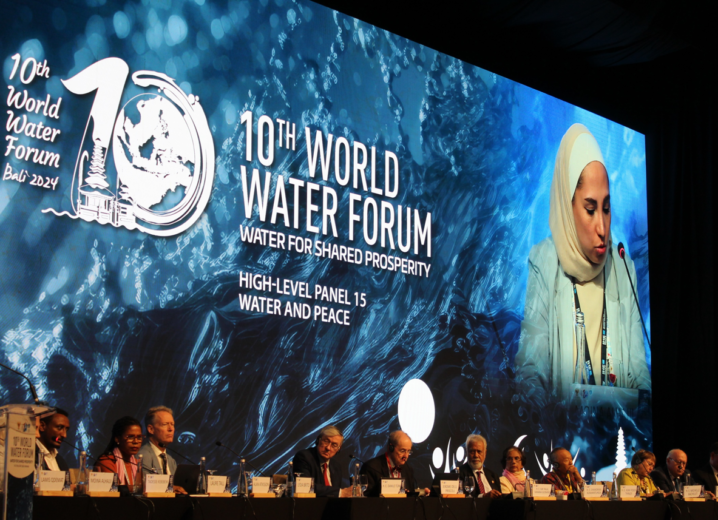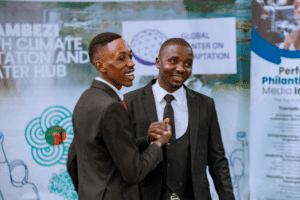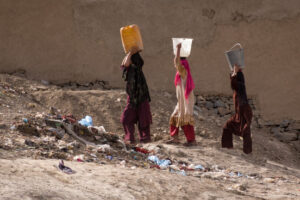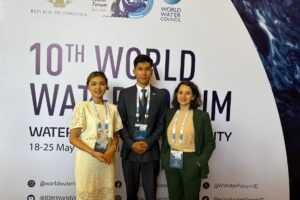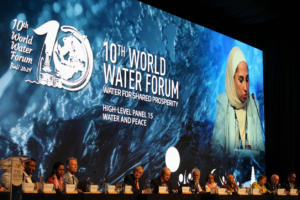Description
This is a blog written by Tuwend Nooma Jean Damase (delegate from Burkina Faso) & Rafaella Espeçoto (delegate from Brazil), Youth of the 6th General Assembly of the World Youth Parliament for Water.
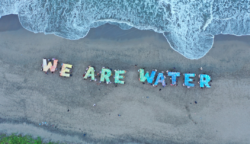
From May 18th to 25th, 2024, the voices of the world’s youth resonated in Bali, Indonesia. Throughout the 10th World Water Forum, and within the framework of the 6th General Assembly of the World Youth Parliament for Water – organised by the International Secretariat for Water-, the young delegates spoke for water, for peace, and for the future of our planet.
The 10th World Water Forum, held in Bali, Indonesia, provided a significant platform to discuss global water issues. Under the theme “Water for Shared Prosperity”, the forum brought together nearly 64,000 experts, decision-makers, and water stakeholders from over 170 countries. The forum focused on six priorities: Water Security and Prosperity, Water for Humanity and Nature, Disaster Risk Reduction and Management, Governance, Cooperation, and Hydro-diplomacy, Sustainable Water Financing, and Knowledge and Innovation.
Over the past years, the World Youth Parliament for Water (WYPW) has consistently highlighted the crucial role of young people in implementing sustainable water management practices. During its 6th General Assembly, organized by the International Secretariat for Water with the support of the Swiss Agency for Development and Cooperation l’Agence de l’Eau-Artois Picardie & WaterAid and held in conjunction with the World Water Forum, we, the more than 85 young people from 55 countries, reaffirmed our commitment to addressing the interconnected challenges of water, sanitation, and climate change. Convinced that the climate crisis is also a water crisis, we called for the integration of water resource management into climate change adaptation policies and resilience building.
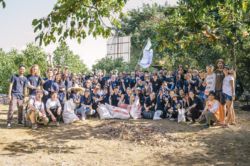
Our manifesto demanded increased involvement of young people in decision-making processes, asserting that they bring innovative solutions and a long-term vision essential to tackling these issues. We also advocated for strengthened policies and investments to ensure universal access to water and sanitation (WASH), emphasizing gender equity and the inclusion of indigenous and local communities. Furthermore, we recommended climate-resilient solutions that leverage community knowledge and reduce bureaucratic barriers to facilitate the implementation of WASH projects. Capacity building is crucial for mobilizing resources in some Southern countries. Hence, we call for strengthening the capacities of countries to increase the mobilization of the private sector and innovative funds (Green Climate Fund, Adaptation Fund, and Loss and Damage Fund). Additionally, endogenous financing mechanisms such as Burkina Faso’s Water Financing Contribution (CFE) are necessary as they enable the funding of local projects.
Successes and Challenges of the 10th World Water Forum
As participants representing different countries and backgrounds, we found the forum both inspiring and challenging.
Jean Damase : As a representative of Burkina Faso, and the Youth Parliament for Water of Burkina Faso, I found the Forum both inspiring and challenging. On the one hand, the Forum successfully brought together diverse actors, including young people, to discuss and engage in concrete solutions. The quality of the sessions and the efforts to engage young people were particularly encouraging. Several initiatives, such as the Bali Youth Plan, the Bali Youth Representative initiative, and the Youth Space, allowed young people to actively engage in the process.
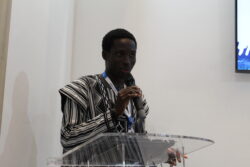
Rafaella : Representing Brazil, a country that holds a significant percentage of the world’s freshwater resources yet faces numerous WASH challenges due to climate change, I found the discussions on climate resilience and the inclusion of vulnerable populations incredibly important. Brazil has recently experienced extreme droughts and floods, such as the severe flooding in Rio Grande do Sul, which left many people homeless and without access to clean water. These events highlight the urgent need for robust policies and investments to ensure that all communities, especially the most vulnerable, can access safe water and sanitation even in the face of climate-induced adversities. It is crucial that we prioritize innovative and inclusive solutions to build resilience against such challenges.
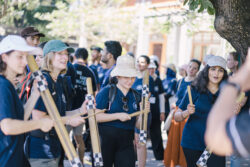
Several sessions highlighted youth-led initiatives and poignant stories. As Lamis Qdemat, a World Youth Parliament for Water delegate from Palestine poignantly stated, ‘It is not just against the people, but also against the environment. There is pollution, creating new environmental problems’ calling to stop the weaponization of water. These hopeful examples emphasize the importance of further strengthening the role of young people in decision-making spheres, as well as in water diplomacy and conflict resolution mechanisms.
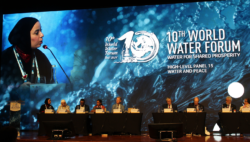
However, there were also moments of frustration. As noted by Professor Toshio Koike from the International Centre for Water Hazard and Risk Management (ICHARM) in his closing remarks during the session “Optimizing Finance, Governance, Capacity Building, and Institutional Arrangements to Reduce Water-Related Disaster Risk”: “All water problems, as well as the solutions to end them, are known. We must therefore have the courage to act”. We fully share this viewpoint. Time is running out. We have only six years left to achieve the SDG6 targets, and much remains to be done. Let us hope that these major meetings and the strong recommendations that emerge will have a tangible and positive impact on communities’ lives and the sustainability of the resource.
While the Forum has paved the way for promising initiatives, the challenge remains to transform these commitments into concrete actions and results, genuinely integrating the perspectives and leadership of young people.
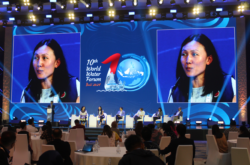
Looking to the Future: Upcoming Events and Opportunities
Looking ahead to upcoming processes such as the 60th sessions of the UNFCC Subsidiary Body for Implementation in Bonn, the One Water Summit, COP29, and United Nations Water Conference 2026, our hopes and expectations are high. We anticipate that these processes will offer new opportunities to advance our calls to action on water. At the climate meeting in Bonn, we hope to see progress in strengthening the link between water and climate, as well as the completion of institutional arrangements for the operationalization of the Loss and Damage Fund. We also hope for stronger commitments to integrate Nature-based Solutions (NbS) into disaster risk reduction strategies and urban planning, ensuring that water management practices are sustainable and resilient.
We, the youth, will advocate upstream in our countries and with negotiators to promote these positions and ensure the follow-up of commitments made. Beyond advocacy, we want to be at the negotiation table.
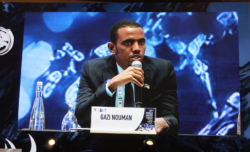
The One Water Summit and COP29 represent critical moments to push for the implementation of the global commitments made at the 10th World Water Forum. Additionally, the G20 summit represents a strategic moment to push for commitments from the world’s largest economies to invest in sustainable and equitable WASH solutions, leveraging both private sector involvement and innovative financing mechanisms to address the urgent climate challenges faced by vulnerable communities.
Our main concern is that the momentum generated by these forums may not translate into sustained actions. We are also worried about the potential exclusion of marginalized communities in these processes. Water must finally become the lever for peace it should have been.


